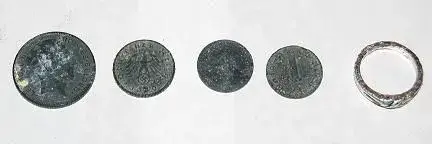Whydah
a very good day and a very cool find, i'd go out at low tide and look again
cant seem to find anything yet, on what was on the four barges
can you post a slide show of the coins, would be nice to see them individually
here is some info on the u boat
By the time the San Diego had settled on the ocean floor, the U-156 was well on the way to her next destination, the Massachusetts coast. There her crew planned to wreak havoc on the American and Canadian North Atlantic fishing fleet. In 1918 Orleans, Massachusetts, was a small village of about 1,000 residents on Cape Cod's elbow. Since its incorporation in 1797, the town had depended on the ocean for its livelihood, harvesting salt and fish from its waters. In December 1814, the town experienced a taste of war when local militia repelled an attack by marines from the British ship Newcastle. Now, just over a century later, Orleans was facing another attack from the sea.
As the U-156 continued shelling the vessels offshore, Reuben Hopkins remained behind to man the coast guard station while the rest of the crew ran to the beach to assist those who had escaped ashore in lifeboats. Hopkins watched from the tower as the U-156 continued to lay a steady, if somewhat erratic, fire from twin 150-mm deck guns. The submarine made short work of the tug Perth Amboy, and then, one by one, attacked each of the four barges along the tug's towline, but it did not send any shells ashore. Soon HS-2 and R-9 seaplanes from Chatham Naval Air Base arrived to attack the German submarine. Their fire was ineffective, and the few bombs they dropped failed to explode. The U-156 slipped away before the naval aviators Well-known aviators
People largely known for their contributions to the history of aviation
While all of these people were pilots (and some still are), many are also noted for contributions in areas such as aircraft design and manufacturing, navigation or could muster a more organized attack.
The U-boat succeeded to some degree in its goal of frightening the American public. People on land and sea alike reported hearing gun battles off the coast. Rumors abounded that deep in the Atlantic a "mother ship" tended to the U-156 and other German submarines that were to follow. Newspapers offered rewards for information leading to the discovery of alleged German submarine supply bases along Canada's Bay of FundyNoun 1. Bay of Fundy - a bay of the North Atlantic between New Brunswick and Nova Scotia; noted for rapid tides as great as 70 feet
Atlantic, Atlantic Ocean - the 2nd largest ocean; separates North and South America on the west from Europe and Africa on the east
..... Click the link for more information.. Secretary of the Navy Daniels ordered the media not to report on American ship movements, and the government barred aliens from all coastal areas and required passes and official identification cards for both individuals and their ships. Seacoast towns banned bright lights out of fear spies could use them to signal German submarines.
The day after the Orleans attack, the U-156 found its next victim, the Gloucester fishing schooner schooner (sk`nər), sailing vessel, rigged fore-and-aft, with from two to seven masts. Robert and Richard. The submarine sank her 100 miles off the Maine coast. During the next 20 days the U-156 ran amok Amok (ā`mŏk), in the Bible, post-Exilic Jewish family. among the fishing fleets, sinking more than 25 American and Canadian schooners. To preserve her limited number of torpedoes, the U-boat usually approached schooners on the surface and halted them with a shot or two across the bow. The Germans then boarded the boats, ransacked ran·sack
tr.v. ran·sacked, ran·sack·ing, ran·sacks
1. To search or examine thoroughly.
2. To search carefully for plunder; pillage. them for anything of value--provisions, maps, and other bits of intelligence--and placed the crews in small boats so they could head for land. Sailors from the submarine then placed bombs in the ships' hulls or set them on fire.
more
http://www.thefreelibrary.com/The+U+boat+That+Threatened+America.-a080898486
...in 1918, people in the Cape Cod town of Orleans were astonished to see a German U-boat surface offshore and begin firing on an unarmed tugboat and the four barges it was pulling. Torpedoes set the tug ablaze and injured its crew, while constant shelling sank the barges. Thanks to the skill and courage of Coast Guardsmen, everyone was rescued. Some of the shells fired from the sub landed on the beach, making this the first time the U.S. mainland had been attacked since the War of 1812 and the only time the country was attacked during World War I. The state had been producing arms, vehicles, and supplies for the war effort and sending soldiers abroad, but no one expected what occurred that Sunday in Orleans.
http://www.massmoments.org/index.cfm?mid=212 DSC_0056.webp36.9 KB · Views: 5,561
DSC_0056.webp36.9 KB · Views: 5,561 DSC_0057.webp23.5 KB · Views: 5,300
DSC_0057.webp23.5 KB · Views: 5,300 DSC_0058.webp22.1 KB · Views: 5,240
DSC_0058.webp22.1 KB · Views: 5,240 DSC_0059.webp23.9 KB · Views: 5,205
DSC_0059.webp23.9 KB · Views: 5,205 DSC_0061.webp10.1 KB · Views: 5,094
DSC_0061.webp10.1 KB · Views: 5,094 DSC_0065.webp17.1 KB · Views: 5,210
DSC_0065.webp17.1 KB · Views: 5,210 DSC_0067.webp18.1 KB · Views: 5,431
DSC_0067.webp18.1 KB · Views: 5,431 DSC_0072.webp10.9 KB · Views: 5,096
DSC_0072.webp10.9 KB · Views: 5,096 DSC_0074.webp14.5 KB · Views: 5,019
DSC_0074.webp14.5 KB · Views: 5,019 DSC_0073.webp10.5 KB · Views: 5,134
DSC_0073.webp10.5 KB · Views: 5,134


 Wish I was closer to a beach. OK, OK, wish I was closder to that beach.
Wish I was closer to a beach. OK, OK, wish I was closder to that beach. 
